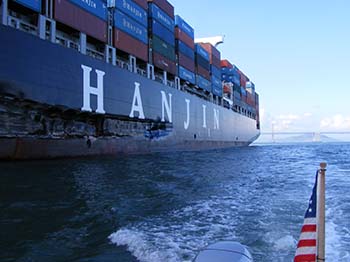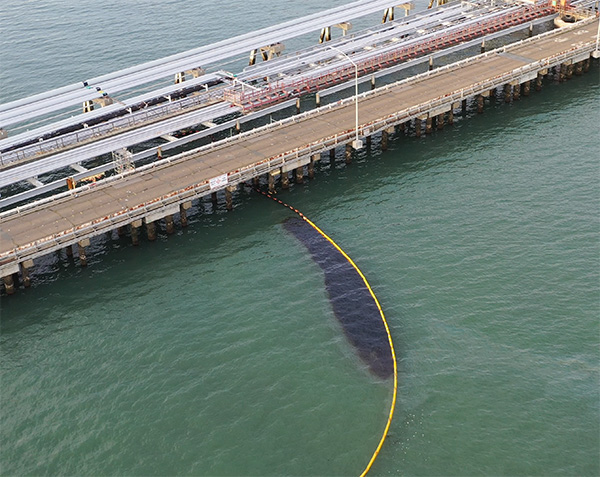
The news this past month has felt like a nightmare I've had before. Toxic oil devastated our beautiful Southern California shorelines, and the headlines were ghosts of the past. There were critical communication gaps between federal and local officials, delays in the initial response, dramatic miscalculations of the spill's magnitude, and a lack of trained volunteers. We seem to relive the same horrors during practically every major oil spill.
During the Cosco Busan disaster in 2007, initial reports estimated that about 400 gallons of crude oil had been spilled into San Francisco Bay. Our boat was on patrol that day, and Baykeeper’s skipper could tell the spread of the oil was too wide to be only 400 gallons. We recorded GPS coordinates of where we were finding oil and providing that information to the officials and the media. It was no surprise to us when 8 hours later the spill number was revised to 53,000 gallons.

With oil spills, lost time translates directly into irreparable harm. If a properly sized response can be mounted within the first few hours, there’s hope of containing the oil. But once that window closes and the oil disperses in the water, the spill is out of control because natural elements—wind, sun, tides—spread it even further.
By the time the public discovered how much oil the Cosco Busan had dumped into the Bay, the Bay’s shorelines had already been blackened. Local agencies weren’t alerted in time, so they weren’t able to prepare. Fifty beaches were closed for over month. More than 6,000 birds died. And for days, the oil sloshed out of the Golden Gate and back in again, spreading the deadly crude far and wide.
After this oil spill, and many other spills since then, Baykeeper’s staff worked with state agencies and lawmakers to develop new laws to fix the flaws that we witnessed firsthand in the response. I thought for certain that these lessons would have been learned and implemented throughout the state all these years later. Unfortunately, the recent spill off Huntington Beach resurrected eerily similar concerns:
Valuable initial response time was lost when cities were caught off guard. One of the new laws we sponsored in 2008 requires the Office of Emergency Services to notify local authorities immediately after a spill is reported. But the mayor of Huntington Beach heard about the spill hours after it happened, and even then, she said she was initially told there was nothing to worry about. The oil later reached coastal shorelines, and cities were unprepared.
Safety alarms and automatic shutoff equipment were nonexistent. Another state law we helped pass in 2015 requires automatic shutoff valves to better ensure oil pipeline safety. However, Southern California’s Amplify Energy operates under federal jurisdiction, which doesn’t have these same requirements—as if federal oil pipelines are any less dangerous. (And by the way, this same scare came up recently in the Bay too, when a corroded Chevron pipeline leaked nearly 700 gallons of oil into Richmond waters this past February because auto shutoff mechanisms were not in place. The spill is still being investigated by local authorities).
Trained emergency responders were in shortage. A law we helped pass in 2008 is supposed to ensure that enough emergency workers are trained and ready to be deployed as soon as a spill report comes in. While it was heartening to see the public clamoring to help clean up after the Huntington Beach spill, unskilled volunteer forces don’t have the depth of training and experience needed to deal with hazardous oil, and they shouldn't have to. So why do we keep experiencing these nightmarish spills? A post mortem of the past 15 years shows that despite the new laws and safeguards we've won, we continue to be haunted by oils spills. The only foolproof way to prevent oil spills is to stop using dirty fossil fuels, and turn instead to clean energy. That's why Baykeeper is making it a top priority to make that transition happen. And when it does, the Bay, its wildlife, and our communities can be healthier—and we can all sleep a little easier.

Sejal Choksi-Chugh, Executive Director
Photo of the Chevron oil spill in Richmond, top right, by Baykeeper. Headshot of Sejal by Gail Odom.